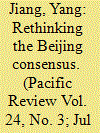|
|
|
Sort Order |
|
|
|
Items / Page
|
|
|
|
|
|
|
| Srl | Item |
| 1 |
ID:
141175


|
|
|
|
|
| Summary/Abstract |
This paper analyzes the short-term and long-term effects that the global economic crisis and the investment priorities of the Chinese Government's stimulus package had on Chinese migrant flows between 2008 and 2014. Combining micro-level household survey data and macro-level statistics, the authors have found that in the short run, the regional and sectoral impact of the crisis, combined with the government's investment priorities, caused a reorientation of migration routes from the export-oriented coastal provinces towards the central and western regions, from inter-provincial migration towards intra-provincial migration, and from manufacturing industry towards the construction sector. However, in the longer run, the decreasing attractiveness of the eastern region and the increasing attractiveness of the western region proved to be transitory, although the pre-crisis relative advantage of the eastern region was not fully restored. What proved to be persistent were the attractiveness of the central region and the intra-provincial migration in all three regions, and, in particular, the steady growth of migrants in the construction sector.
|
|
|
|
|
|
|
|
|
|
|
|
|
|
|
|
| 2 |
ID:
106006


|
|
|
|
|
| Publication |
2011.
|
| Summary/Abstract |
This paper discusses the role of the Beijing Consensus type of foreign and economic policymaking in China's development since the Asian financial crisis and in its response to the global crisis, and argues that it has been a double-edged sword, as reflected in several aspects. First, the lesson that China learned from the Asian financial crisis was not the importance of liberalisation but prudence or conservativeness, which despite serving as a shield this time sustains problems in the long term. Second, an obsession with foreign reserves accumulation and the pursuit of political influence have for a long time overshadowed the increasing dependence on the US market, putting China in a dilemma now in both development and diplomatic strategies. Third, centralised decision-making may be faster than democratic processes, but it may also go against the principle of 'scientific decision' as proposed by the Chinese leadership. A prominent feature of China's responses to the crisis is a bias towards state-owned enterprises and the public sector, which exacerbates the existing problems of monopoly, over-capacity, inequality, the regulators being 'captured' by industrial interests and protectionism. Given limited economic resources, domestic political contentions and the questionable credibility of the China Model, it would be difficult for China to practice 'responsible great power' diplomacy or assume leadership in the region or globally.
|
|
|
|
|
|
|
|
|
|
|
|
|
|
|
|
|
|
|
|
|